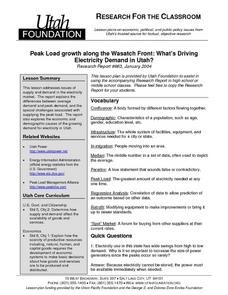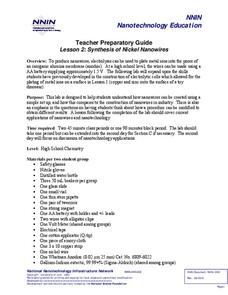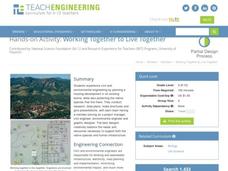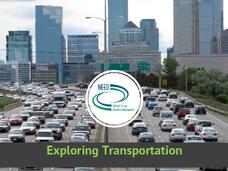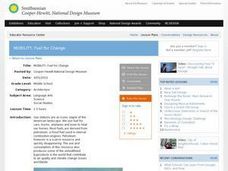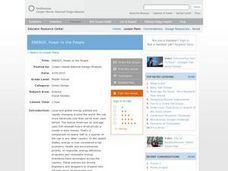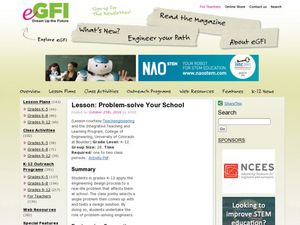Curated OER
What Does It Cost to Use It?
Learners investigate how electrical usage is counted. For this electricity lesson, students research an electric bill and define terms such as watts and kilowatts. Learners calculate the average electricity cost per year by using a...
Curated OER
Peak Load Growth Along the Wasatch Front: What's Driving Electricity Demand in Utah?
Students study how electricity is used in Utah. They create an advertising plan to educate consumers about peak cycles and energy costs for the cycling service of electricity. They present their advertising plan to the class for...
Bonneville
Renewable Energy Panel
Plan a panel on public policy. On the first day of lessons, scholars identify local government planners and create questions to ask regarding renewable energy and infrastructure. On the second day, they conduct the panel and learn about...
PBS
America's Infrastructure: Miller Center National Discussion Debate Series
Junior high and high school learners study infrastructure and its relationship to the current economy. They review handouts, watch a PBS clip, and review case studies in order to answer provided questions and role play over...
National Nanotechnology Infrastructure Network
Save the Dinosaurs with Copper and Zinc!
Create a coat of armor for dinosaur volunteers. Young scientists explore the oxidation-reduction reaction facilitated by electric current. The result of the reaction is a dinosaur coated in copper and zinc, which leads to an...
Government of South Australia
Don't Waste Your Energy
Don't lift another finger, this physical and environmental science unit has everything you need to begin teaching your class about energy. Starting with a look at the greenhouse effect, these lessons and activities take young scientists...
National Nanotechnology Infrastructure Network
Small Scale Stenciling: Mask Lab
Investigate the procedure for developing computer chips! Learners use solar print paper to create both positive and negative images. They observe the effects of single and multiple exposures and compare results.
National Nanotechnology Infrastructure Network
Synthesis of Nickel Nanowires
It's all about the scale—they're not just wires, they're nanowires! The second lesson plan of the series builds on the oxidation-reduction experiment in the first lesson plan. Scholars synthesize a sample of nanowires using electrolysis....
Teach Engineering
Working Together to Live Together
Whose home is it anyway? Design teams plan a housing development in which they must also protect a native species. The teams consist of a project manager, civil engineer, environmental engineer, and graphic designer. Teams present their...
National Energy Education Development Project
Exploring Transportation
Did you know horsepower is actually based on the power of a horse? 60 horse power is the equivalent of being pulled by a team of 60 horses! Viewers will learn other interesting facts like this from a presentation that begins with the...
Curated OER
Fuel Cell Experimentation
With rising oil prices and increasing concerns over global warming, the pressure is on for engineers to develop alternative sources of energy. Among the new technologies being developed are hydrogen fuel cells, which young scientists...
National Nanotechnology Infrastructure Network
Is Measuring an Art or a Science?
Not only do future engineers learn the difference between accuracy and precision, they also get some hands-on experience using different measuring tools.
National Nanotechnology Infrastructure Network
Understanding Wave Motion - Slinky vs. Snaky: Which Spring is Dominant?
Ride the wave to an understanding of refraction! The first in a series of two inquiry-based lessons challenges learners to create transverse waves with two different types of springs. As their wave hits an object, they observe the change...
National Energy Education Development Project
Exploring Hybrid School Bus Technology
The color School Bus Yellow was created in 1939 because science had proven peripheral vision detects yellow 1.24 times faster than other colors. Young scientists explore modern school bus transportation options and then discuss the...
Curated OER
Mobility: Fuel for Change
Young scholars determine how to lower the reliance on petroleum-based fuel. In this environmental stewardship lesson, students create concept cars for the future that using renewable energy.
Curated OER
Energy: Power to the People
Students explore the concept of renewable energy. In this green design lesson, students research local energy issues facing their community and create policies to address the issues.
Curated OER
The Efficient City
Middle schoolers research and create a realistic plan for energy efficiency. In this investigative lesson students answer questions and fill out a worksheet on energy.
Curated OER
Food Systems Feed the World
Students discover how getting food from farm-to-fork involves several steps and many hands. In this interactive food chain lesson, students respond to a series of questions about food distribution then work collaboratively to create a...
Curated OER
Problem Solve Your School
Young scholars work together to solve a real life problem that affects their school. They follow the engineering design process to develop and test their solution. They share their ideas with the class.
Curated OER
Fresh or Salty?
Students explore water bodies on the planet Earth and their various uses and qualities. They examine several ways that engineers are working to maintain and conserve water sources and think about their role in water conservation....
Curated OER
Island Hopping
Pupils utilize a variety of math skills to explore the Turks and Caicos Islands, the British Territory to which South Caicos belongs. They select and apply quantitative data to support their recommendations for future investment and...
Curated OER
Water Consumption, Pricing and Conservation in Utah.
Learners investigate the research report that measures the levels of water usage for Utah. They focus on conservation efforts that are currently being used. They reflect upon their own amount of water usage and research methods of...



